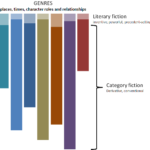 From the New York Times:
From the New York Times:
A federal judge on Friday approved a settlement in which Apple could begin paying $400 million to as many as 23 million consumers related to charges that it violated antitrust law by conspiring with publishers to raise e-book prices and thwart efforts by Amazon …
Apple initially agreed to pay up to $400 million to settle the class action in June, ahead of a damages trial set for two months later in which attorneys general in 33 states and class-action lawyers were expected to seek up to $840 million …
The suit accused Apple of being a “ringmaster” of a conspiracy with the five major publishers to raise the average price of e-books from the $9.99 price that Amazon had made standard for new e-book releases. Simon & Schuster, HarperCollins and the Hachette Book Group settled the day the case was filed; Penguin and Macmillan settled months later.
Read the rest here.
And, to reiterate, I recognize the economic danger of Amazon’s size, but (a) Amazon is nowhere near a monopoly or monopsony, (b) it was Amazon’s competitor Apple that showed its willing to break the law to the rip off readers, and (c) the Big Five were an economically dangerous cartel long before Amazon’s first 1’s and 0’s hit the Internet, and they prove their intentions to behave as a cartel again and again, to the detriment of readers and writers.
The facts in this scandal make the deluded National Book Awards polemic delivered by Ursula Le Guin, who is otherwise a remarkable advocate for literature, all the more tragic. Continue reading →

 In chapter 120 of the Chinese classic, Wen-Tzu’s Book of Pervading Mystery (通玄真經), we read: “If they are valued for what is valuable about them, then all things are valuable. If they are despised for what is worthless about them, then all things are worthless.”1
In chapter 120 of the Chinese classic, Wen-Tzu’s Book of Pervading Mystery (通玄真經), we read: “If they are valued for what is valuable about them, then all things are valuable. If they are despised for what is worthless about them, then all things are worthless.”1
 From the New York Times:
From the New York Times:
 Writing a great short story is difficult. Very often a short story will end up feeling like a novel or novella folded onto itself, so that parts of the story seeming rushed or compressed, while other parts seems stretched out by comparison. And, I say that meaning it’s still a great short story, the same way a sunflower seed is tasty to eat, but has larger possibilities folded inside it. Writers sometimes give in to the narrative tension wrapped into the short story form, and refuse to accept that their own work is “good enough” while it still feels bursting with potential.
Writing a great short story is difficult. Very often a short story will end up feeling like a novel or novella folded onto itself, so that parts of the story seeming rushed or compressed, while other parts seems stretched out by comparison. And, I say that meaning it’s still a great short story, the same way a sunflower seed is tasty to eat, but has larger possibilities folded inside it. Writers sometimes give in to the narrative tension wrapped into the short story form, and refuse to accept that their own work is “good enough” while it still feels bursting with potential.